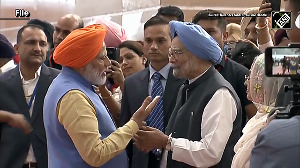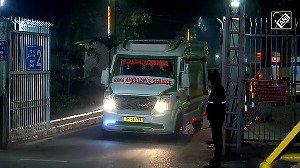The Indian Navy on Tuesday admitted that it was a "systemic failure" on the part of the security and intelligence establishment that led to the terror attacks in Mumbai, and that lacunae did exist in India's coastal security and intelligence sharing mechanisms.
It maintained that it did not receive any "actionable" input to effectively prevent the tragedy.
Navy chief Admiral Sureesh Mehta told reporters in Delhi that it was "a systemic failure" on the part of the security and intelligence establishment that led to the terror strike and promised that the government would come up with an adequate response to the issues raised by the dastardly attacks that claimed over 180 lives and left another 300 wounded.
"There is perhaps a lacuna that exists and we will work to sort this out. There is a systemic failure, which needs to be taken stock of. The response from the government is going to be adequate," Mehta said at his annual press conference ahead of the Navy Day observed on December 4.
Pointing out that the public outrage was definitely visible, the Navy chief, responding to a query, said the government was fully conscious of it and the debate that followed the Mumbai attacks.
"We have all seen it sitting in our drawing rooms. We are fully conscious of it and the debate. The point is it is a serious issue... a serious matter of security," he said.
Stating that exchange of information was an operational function, which went on at fairly regular intervals, the Navy chief called for effective coordination among the several agencies involved in intelligence gathering and security.
"There are several agencies involved and coordination is important. What is important is the information available should be actionable. It should have some specifics to it," he said.






 © 2024 Rediff.com -
© 2024 Rediff.com -